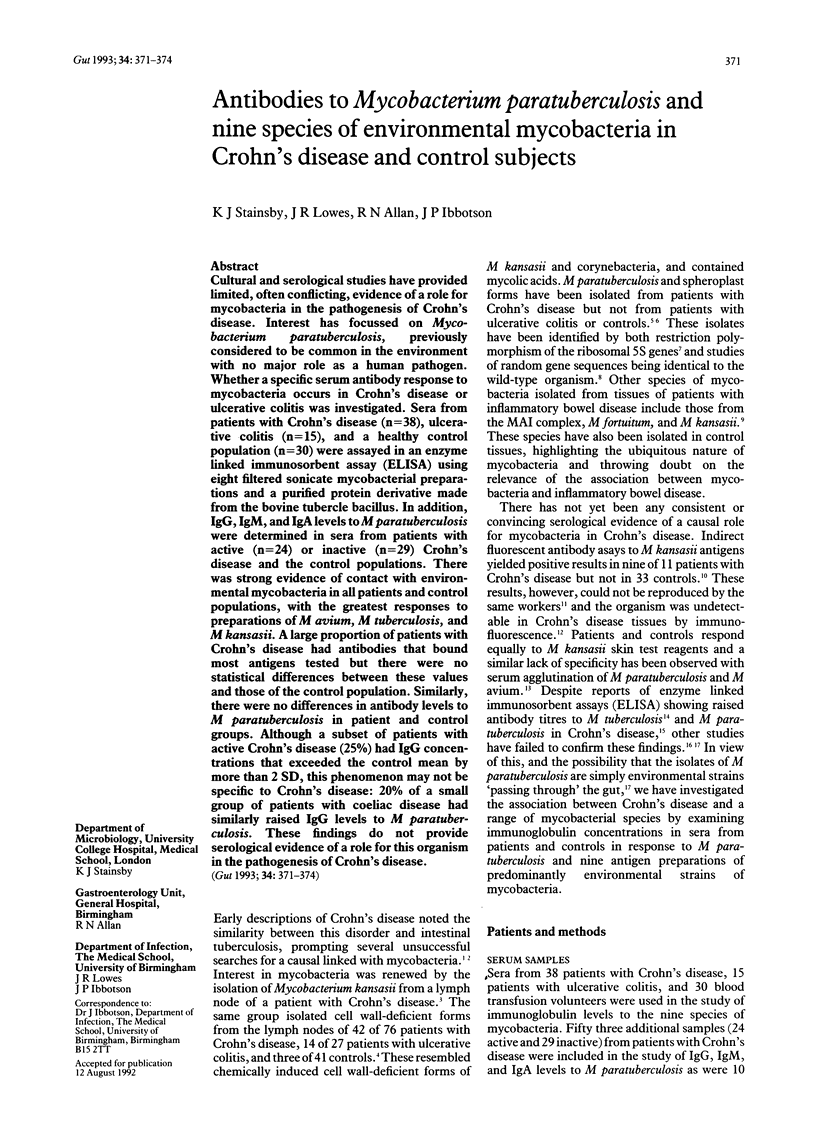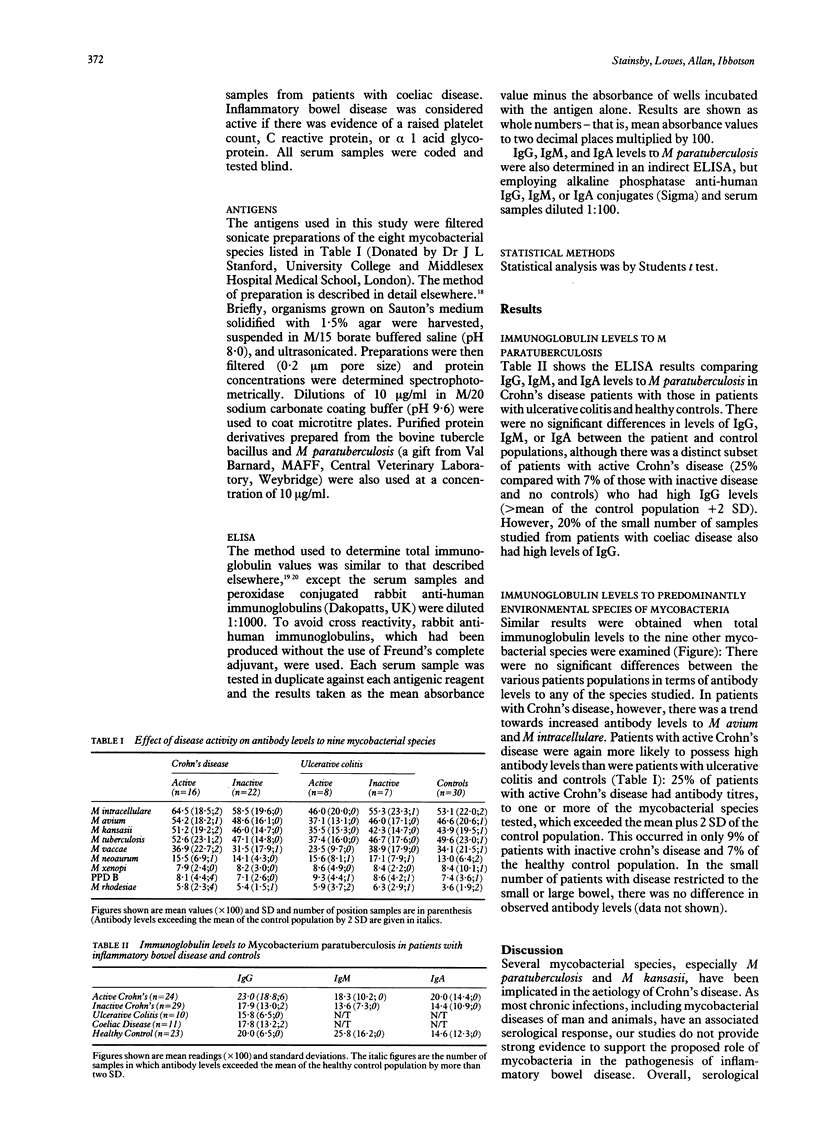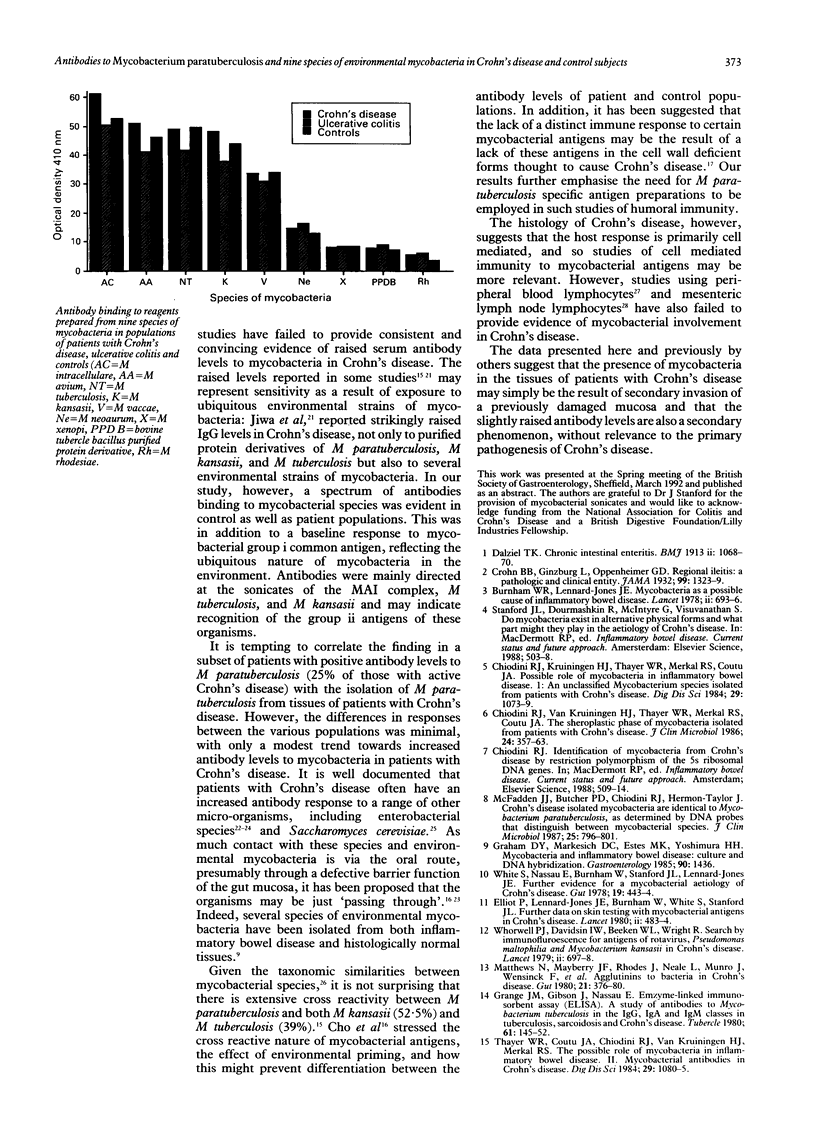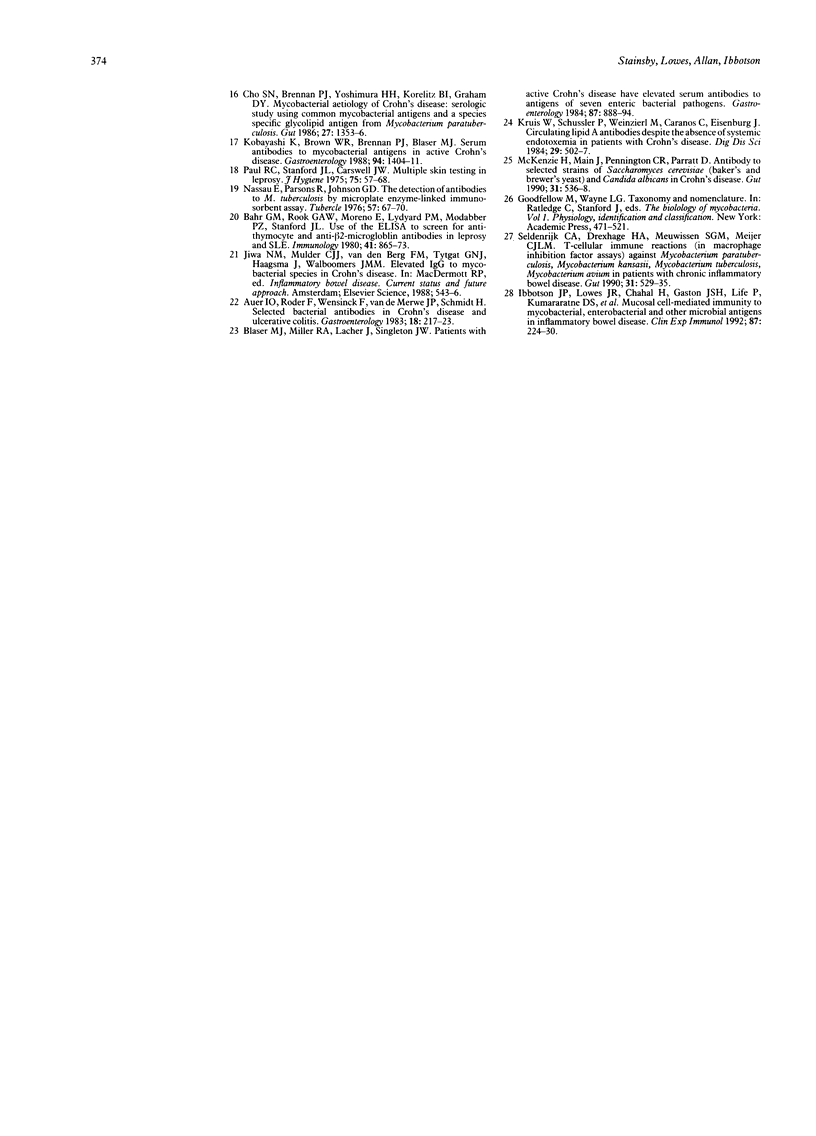Abstract
Cultural and serological studies have provided limited, often conflicting, evidence of a role for mycobacteria in the pathogenesis of Crohn's disease. Interest has focussed on Mycobacterium paratuberculosis, previously considered to be common in the environment with no major role as a human pathogen. Whether a specific serum antibody response to mycobacteria occurs in Crohn's disease or ulcerative colitis was investigated. Sera from patients with Crohn's disease (n = 38), ulcerative colitis (n = 15), and a healthy control population (n = 30) were assayed in an enzyme linked immunosorbent assay (ELISA) using eight filtered sonicate mycobacterial preparations and a purified protein derivative made from the bovine tubercle bacillus. In addition, IgG, IgM, and IgA levels to M paratuberculosis were determined in sera from patients with active (n = 24) or inactive (n = 29) Crohn's disease and the control populations. There was strong evidence of contact with environmental mycobacteria in all patients and control populations, with the greatest responses to preparations of M avium, M tuberculosis, and M kansasii. A large proportion of patients with Crohn's disease had antibodies that bound most antigens tested but there were no statistical differences between these values and those of the control population. Similarly, there were no differences in antibody levels to M paratuberculosis in patient and control groups. Although a subset of patients with active Crohn's disease (25%) had IgG concentrations that exceeded the control mean by more than 2 SD, this phenomenon may not be specific to Crohn's disease: 20% of a small group of patients with coeliac disease had similarly raised IgG levels to M paratuberculosis. These findings do not provide serological evidence of a role for this organism in the pathogenesis of Crohn's disease.
Full text
PDF



Selected References
These references are in PubMed. This may not be the complete list of references from this article.
- Auer I. O., Röder A., Wensinck F., van de Merwe J. P., Schmidt H. Selected bacterial antibodies in Crohn's disease and ulcerative colitis. Scand J Gastroenterol. 1983 Mar;18(2):217–223. doi: 10.3109/00365528309181586. [DOI] [PubMed] [Google Scholar]
- Bahr G. M., Rook G. A., Moreno E., Lydyard P. M., Modabber F. Z., Stanford J. L. Use of the ELISA to screen for anti-thymocyte and anti-beta 2-microglobulin antibodies in leprosy and SLE. Immunology. 1980 Dec;41(4):865–873. [PMC free article] [PubMed] [Google Scholar]
- Blaser M. J., Miller R. A., Lacher J., Singleton J. W. Patients with active Crohn's disease have elevated serum antibodies to antigens of seven enteric bacterial pathogens. Gastroenterology. 1984 Oct;87(4):888–894. [PubMed] [Google Scholar]
- Burnham W. R., Lennard-Jones J. E., Stanford J. L., Bird R. G. Mycobacteria as a possible cause of inflammatory bowel disease. Lancet. 1978 Sep 30;2(8092 Pt 1):693–696. doi: 10.1016/s0140-6736(78)92699-5. [DOI] [PubMed] [Google Scholar]
- Chiodini R. J., Van Kruiningen H. J., Thayer W. R., Coutu J. A. Spheroplastic phase of mycobacteria isolated from patients with Crohn's disease. J Clin Microbiol. 1986 Sep;24(3):357–363. doi: 10.1128/jcm.24.3.357-363.1986. [DOI] [PMC free article] [PubMed] [Google Scholar]
- Chiodini R. J., Van Kruiningen H. J., Thayer W. R., Merkal R. S., Coutu J. A. Possible role of mycobacteria in inflammatory bowel disease. I. An unclassified Mycobacterium species isolated from patients with Crohn's disease. Dig Dis Sci. 1984 Dec;29(12):1073–1079. doi: 10.1007/BF01317078. [DOI] [PubMed] [Google Scholar]
- Cho S. N., Brennan P. J., Yoshimura H. H., Korelitz B. I., Graham D. Y. Mycobacterial aetiology of Crohn's disease: serologic study using common mycobacterial antigens and a species-specific glycolipid antigen from Mycobacterium paratuberculosis. Gut. 1986 Nov;27(11):1353–1356. doi: 10.1136/gut.27.11.1353. [DOI] [PMC free article] [PubMed] [Google Scholar]
- Elliott P. R., Lennard-Jones J. E., Burnham W. R., White S., Stanford J. L. Further data on skin testing with mycobacterial antigens in inflammatory bowel disease. Lancet. 1980 Aug 30;2(8192):483–484. doi: 10.1016/s0140-6736(80)91922-4. [DOI] [PubMed] [Google Scholar]
- Grange J. M., Gibson J., Nassau E., Kardjito T. Enzyme-linked immunosorbent assay (ELISA): a study of antibodies to Mycobacterium tuberculosis in the IgG, IgA and IgM classes in tuberculosis, sarcoidosis and Crohn's disease. Tubercle. 1980 Sep;61(3):145–152. doi: 10.1016/0041-3879(80)90003-3. [DOI] [PubMed] [Google Scholar]
- Ibbotson J. P., Lowes J. R., Chahal H., Gaston J. S., Life P., Kumararatne D. S., Sharif H., Alexander-Williams J., Allan R. N. Mucosal cell-mediated immunity to mycobacterial, enterobacterial and other microbial antigens in inflammatory bowel disease. Clin Exp Immunol. 1992 Feb;87(2):224–230. doi: 10.1111/j.1365-2249.1992.tb02979.x. [DOI] [PMC free article] [PubMed] [Google Scholar]
- Kobayashi K., Brown W. R., Brennan P. J., Blaser M. J. Serum antibodies to mycobacterial antigens in active Crohn's disease. Gastroenterology. 1988 Jun;94(6):1404–1411. doi: 10.1016/0016-5085(88)90679-8. [DOI] [PubMed] [Google Scholar]
- Kruis W., Schussler P., Weinzierl M., Galanos C., Eisenburg J. Circulating lipid A antibodies despite absence of systemic endotoxemia in patients with Crohn's disease. Dig Dis Sci. 1984 Jun;29(6):502–507. doi: 10.1007/BF01296269. [DOI] [PubMed] [Google Scholar]
- Matthews N., Mayberry J. F., Rhodes J., Neale L., Munro J., Wensinck F., Lawson G. H., Rowland A. C., Berkhoff G. A., Barthold S. W. Agglutinins to bacteria in Crohn's disease. Gut. 1980 May;21(5):376–380. doi: 10.1136/gut.21.5.376. [DOI] [PMC free article] [PubMed] [Google Scholar]
- McFadden J. J., Butcher P. D., Chiodini R., Hermon-Taylor J. Crohn's disease-isolated mycobacteria are identical to Mycobacterium paratuberculosis, as determined by DNA probes that distinguish between mycobacterial species. J Clin Microbiol. 1987 May;25(5):796–801. doi: 10.1128/jcm.25.5.796-801.1987. [DOI] [PMC free article] [PubMed] [Google Scholar]
- McKenzie H., Main J., Pennington C. R., Parratt D. Antibody to selected strains of Saccharomyces cerevisiae (baker's and brewer's yeast) and Candida albicans in Crohn's disease. Gut. 1990 May;31(5):536–538. doi: 10.1136/gut.31.5.536. [DOI] [PMC free article] [PubMed] [Google Scholar]
- Nassau E., Parsons E. R., Johnson G. D. The detection of antibodies to Mycobacterium tuberculosis by microplate enzyme-linked immunosorbent assay (ELISA). Tubercle. 1976 Mar;57(1):67–70. doi: 10.1016/0041-3879(76)90019-2. [DOI] [PubMed] [Google Scholar]
- Paul R. C., Stanford J. L., Carswell J. W. Multiple skin testing in leprosy. J Hyg (Lond) 1975 Aug;75(1):57–68. doi: 10.1017/s0022172400047069. [DOI] [PMC free article] [PubMed] [Google Scholar]
- Seldenrijk C. A., Drexhage H. A., Meuwissen S. G., Meijer C. J. T-cellular immune reactions (in macrophage inhibition factor assay) against Mycobacterium paratuberculosis, Mycobacterium kansasii, Mycobacterium tuberculosis, Mycobacterium avium in patients with chronic inflammatory bowel disease. Gut. 1990 May;31(5):529–535. doi: 10.1136/gut.31.5.529. [DOI] [PMC free article] [PubMed] [Google Scholar]
- Thayer W. R., Jr, Coutu J. A., Chiodini R. J., Van Kruiningen H. J., Merkal R. S. Possible role of mycobacteria in inflammatory bowel disease. II. Mycobacterial antibodies in Crohn's disease. Dig Dis Sci. 1984 Dec;29(12):1080–1085. doi: 10.1007/BF01317079. [DOI] [PubMed] [Google Scholar]


